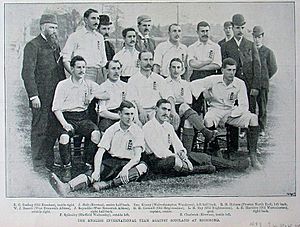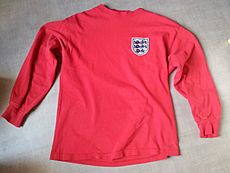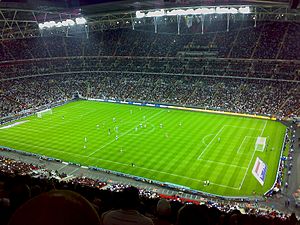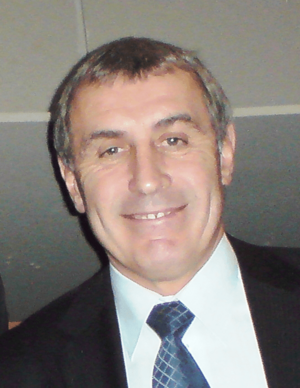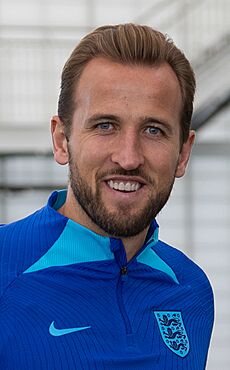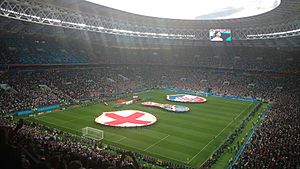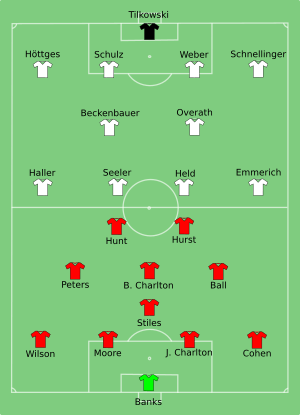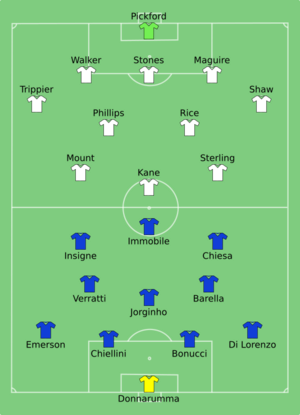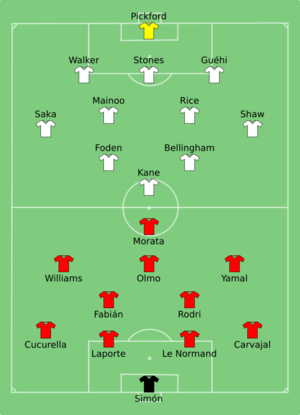England national football team facts for kids
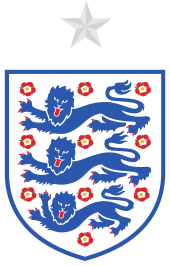 |
|||||||||||||||||||||||||||||
| Nickname(s) | The Three Lions | ||||||||||||||||||||||||||||
|---|---|---|---|---|---|---|---|---|---|---|---|---|---|---|---|---|---|---|---|---|---|---|---|---|---|---|---|---|---|
| Association | The Football Association (The FA) |
||||||||||||||||||||||||||||
| Confederation | UEFA (Europe) | ||||||||||||||||||||||||||||
| Head coach | Thomas Tuchel (from 1 January 2025) |
||||||||||||||||||||||||||||
| Captain | Harry Kane | ||||||||||||||||||||||||||||
| Most caps | Peter Shilton (125) | ||||||||||||||||||||||||||||
| Top scorer | Harry Kane (69) | ||||||||||||||||||||||||||||
| Home stadium | Wembley Stadium | ||||||||||||||||||||||||||||
| FIFA code | ENG | ||||||||||||||||||||||||||||
|
|||||||||||||||||||||||||||||
| FIFA ranking | |||||||||||||||||||||||||||||
| Current | 5 |
||||||||||||||||||||||||||||
| Highest | 3 (August–September 2012, September–October 2021, November 2023) | ||||||||||||||||||||||||||||
| Lowest | 27 (February 1996) | ||||||||||||||||||||||||||||
| Elo ranking | |||||||||||||||||||||||||||||
| Current | 7 |
||||||||||||||||||||||||||||
| Highest | 1 (1872–1876, 1892–1911, 1966–1970, 1987–1988) |
||||||||||||||||||||||||||||
| Lowest | 17 (11 June 1995) | ||||||||||||||||||||||||||||
| First international | |||||||||||||||||||||||||||||
(Partick, Scotland; 30 November 1872) (The first ever international football match) |
|||||||||||||||||||||||||||||
| Biggest win | |||||||||||||||||||||||||||||
(Belfast, Ireland; 18 February 1882) |
|||||||||||||||||||||||||||||
| Biggest defeat | |||||||||||||||||||||||||||||
(Budapest, Hungary; 23 May 1954) |
|||||||||||||||||||||||||||||
| World Cup | |||||||||||||||||||||||||||||
| Appearances | 16 (first in 1950) | ||||||||||||||||||||||||||||
| Best result | Champions (1966) | ||||||||||||||||||||||||||||
| European Championship | |||||||||||||||||||||||||||||
| Appearances | 11 (first in 1968) | ||||||||||||||||||||||||||||
| Best result | Runners-up (2020, 2024) | ||||||||||||||||||||||||||||
| Nations League Finals | |||||||||||||||||||||||||||||
| Appearances | 1 (first in 2019) | ||||||||||||||||||||||||||||
| Best result | Third place (2019) | ||||||||||||||||||||||||||||
|
Medal record
|
|||||||||||||||||||||||||||||
| Website | englandfootball.com | ||||||||||||||||||||||||||||
The England national football team have represented England in international football since the first international match in 1872. It is controlled by the Football Association (FA), the governing body for football in England, which is affiliated with UEFA and comes under the global jurisdiction of world football's governing body FIFA. England competes in the three major international tournaments contested by European nations: the FIFA World Cup, the UEFA European Championship and the UEFA Nations League.
England are the joint oldest national team in football having played in the world's first international football match in 1872, against Scotland. England's home ground is Wembley Stadium, London, and their training headquarters is at St George's Park, Burton upon Trent. Thomas Tuchel will take over as Head Coach from January 2025.
England won the 1966 FIFA World Cup final on home soil, making them one of eight nations to have won the World Cup. They have qualified for the World Cup sixteen times, with fourth-place finishes in the 1990 and 2018 editions. England have never won the European Championship, with their best performances to date being runners-up finishes in 2020 and 2024. As a constituent country of the United Kingdom, England are not a member of the International Olympic Committee (as English athletes compete for Great Britain), and so do not compete at the Olympic Games. England are the only team to have won the World Cup at senior level but not their major continental title, and the only team representing a non-sovereign country to have won the World Cup.
Contents
History
Early years
The England men's national football team is the joint-oldest in the world; it was formed at the same time as Scotland. A representative match between England and Scotland was played on 5 March 1870, having been organised by the Football Association. A return fixture was organised by representatives of Scottish football teams on 30 November 1872. This match, played at Hamilton Crescent in Scotland, is viewed as the first official international football match, because the two teams were independently selected and operated, rather than being the work of a single football association. Over the next 40 years, England played exclusively with the other three Home Nations—Scotland, Wales and Ireland—in the British Home Championship.
At first, England had no permanent home stadium. They joined FIFA in 1906 and played their first games against countries other than the Home Nations on a tour of Central Europe in 1908. Wembley Stadium was opened in 1923 and became their home ground. The relationship between England and FIFA became strained, and this resulted in their departure from FIFA in 1928, before they rejoined in 1946. As a result, they did not compete in a World Cup until 1950, in which they were beaten in a 1–0 defeat by the United States, failing to get past the first round in one of the most embarrassing defeats in the team's history.
Their first defeat on home soil to a foreign team was a 2–0 loss to Ireland, on 21 September 1949 at Goodison Park. A 6–3 loss in 1953 to Hungary was their second defeat by a foreign team at Wembley. In the return match in Budapest, Hungary won 7–1. This stands as England's largest ever defeat. After the game, a bewildered Syd Owen said, "it was like playing men from outer space". In the 1954 FIFA World Cup, England reached the quarter-finals for the first time, and lost 4–2 to reigning champions Uruguay.
Walter Winterbottom and Alf Ramsey
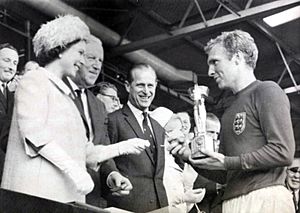
Although Walter Winterbottom was appointed as England's first full-time manager in 1946, the team was still picked by a committee until Alf Ramsey took over in 1963. The 1966 World Cup was hosted in England and Ramsey guided England to victory with a 4–2 win against West Germany after extra time in the final, during which Geoff Hurst scored a hat-trick. In UEFA Euro 1968, the team reached the semi-finals for the first time, being eliminated by Yugoslavia.
England qualified automatically for the 1970 World Cup in Mexico as reigning champions, and reached the quarter-finals, where they were knocked out by West Germany. England had been 2–0 up, but were eventually beaten 3–2 after extra time. They then failed to qualify for Euro 1972 and the 1974 World Cup, leading to Ramsey's dismissal by the FA.
Don Revie, Ron Greenwood and Bobby Robson
Following Ramsey's dismissal, Joe Mercer took immediate temporary charge of England for a seven-match spell until Don Revie was appointed as new permanent manager in 1974. Under Revie, the team underperformed and failed to qualify for either Euro 1976 or the 1978 World Cup. Revie resigned in 1977 and was replaced by Ron Greenwood, under whom performances improved. The team qualified for Euro 1980 without losing any of their games, but exited in the group stage of the final tournament. They also qualified for the 1982 World Cup in Spain; despite not losing a game, they were eliminated at the second group stage.
Bobby Robson managed England from 1982 to 1990. Although the team failed to qualify for Euro 1984, they reached the quarter-finals of the 1986 World Cup, losing 2–1 to Argentina in a game made famous by two highly contrasting goals scored by Diego Maradona – the first being blatantly knocked in by his hand, prompting his "Hand of God" remark, the second being an outstandingly skilful individual goal, involving high speed dribbling past several opponents. England striker Gary Lineker finished as the tournament's top scorer with six goals.
England went on to lose every match at Euro 1988. They next achieved their second best result in the 1990 World Cup by finishing fourth – losing again to West Germany after a closely contested semi-final finishing 1–1 after extra time, then 3–4 in England's first penalty shoot-out. Despite losing to Italy in the third place play-off, the members of the England team were given bronze medals identical to the Italians'. Due to the team's good performance at the tournament against general expectations, and the emotional nature of the narrow defeat to West Germany, the team were welcomed home as heroes and thousands of people lined the streets for an open-top bus parade.
Graham Taylor, Terry Venables, Glenn Hoddle and Kevin Keegan
The 1990s saw four England managers follow Robson, each in the role for a relatively brief period. Graham Taylor was Robson's immediate successor. England failed to win any matches at Euro 1992, drawing with tournament winners Denmark and later with France, before being eliminated by host nation Sweden. The team then failed to qualify for the 1994 World Cup after losing a controversial game against the Netherlands in Rotterdam, which resulted in Taylor's resignation. Taylor faced much newspaper criticism during his tenure for his tactics and team selections.
Between 1994 and 1996, Terry Venables took charge of the team. Hosting Euro 1996, they equalled their best performance at a European Championship, reaching the semi-finals as they did in 1968, before exiting via another penalty shoot-out loss to Germany. England striker Alan Shearer was the tournament's top scorer with five goals. At Euro 96, the song "Three Lions" by Baddiel, Skinner and the Lightning Seeds became the definitive anthem for fans on the terraces, and popularised the chant "it's coming home". Venables announced before the tournament that he would resign at the end of it, following investigations into his personal financial activities and ahead of upcoming court cases. Due to the controversy around him, the FA stressed that he was the coach, not the manager, of the team.
Venables' successor, Glenn Hoddle, took the team to the 1998 World Cup — in which England were eliminated in the second round, again by Argentina and again on penalties (after a 2–2 draw). In February 1999, Hoddle was sacked by the FA due to controversial comments he had made about disabled people to a newspaper. Howard Wilkinson took over as caretaker manager for two matches. Kevin Keegan was then appointed as the new permanent manager and took England to Euro 2000, but the team exited in the group stage and he unexpectedly resigned shortly afterwards.
Sven-Göran Eriksson and Steve McClaren
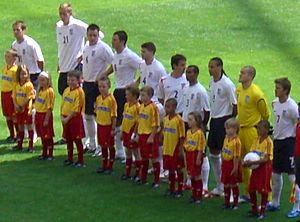
Peter Taylor was appointed as caretaker manager for one match, before Sven-Göran Eriksson took charge between 2001 and 2006, and was the team's first non-English manager. Although England's players in this era were dubbed a "golden generation" and only lost five competitive matches during Eriksson's tenure, they exited at the quarter-finals of the 2002 World Cup, Euro 2004 and the 2006 World Cup. In January 2006 it was announced that Eriksson would leave the role following that year's World Cup. Steve McClaren was selected to succeed Eriksson, but was sacked on 22 November 2007 after just 18 matches in charge as England failed to qualify for Euro 2008. McClaren was criticised for his team selection in his final game - a decisive qualifier against Croatia which England lost 3-2 - particularly the decision to select inexperienced goalkeeper Scott Carson, whose mistake lead to Croatia's first goal.
Fabio Capello, Roy Hodgson and Sam Allardyce
On 14 December 2007, Italian manager Fabio Capello was appointed as McClaren's successor, becoming only the second foreign coach to take the job. At the 2010 World Cup, England were considered favourites to top their group but drew their opening two games against the United States and Algeria; this led to questions about the team's spirit, tactics and ability to handle pressure. Despite this, England progressed to the round of 16, where they were beaten 4–1 by Germany, their heaviest defeat in a World Cup finals tournament match. This match became infamous for a ghost goal when Frank Lampard hit a shot from outside the penalty area that bounced down off the crossbar and over the goal line before being cleared by German goalkeeper Manuel Neuer, with neither the referee nor the assistant opting to award a goal. Had it been given, the goal would have tied the game 2–2 with England coming from two goals down. This incident - along with similar mistakes at the tournament - lead to an apology from FIFA president Sepp Blatter and was a factor in the subsequent decision to introduce goal-line technology into football. Capello continued as England manager, leading the team's successful qualifying campaign for Euro 2012, before resigning from the role in February 2012 following a disagreement with the FA over their request to remove John Terry from the team captaincy following accusations of racial abuse against the player.
Following Capello's departure, Stuart Pearce was appointed as caretaker manager for one match, after which in May 2012, Roy Hodgson was announced as the new manager, just six weeks before Euro 2012. England managed to finish top of their group, but exited the Championship in the quarter-finals via a penalty shoot-out against Italy. In the 2014 World Cup, England were eliminated at the group stage for the first time since 1958. At Euro 2016, England were eliminated in the round of 16, losing 2–1 to Iceland in a result that has been described as among their worst ever defeats. Hodgson tendered his resignation shortly after the full-time whistle, with Sam Allardyce announced as his successor in July 2016. After one match and only 67 days in charge, Allardyce resigned from his managerial post by mutual agreement following an alleged breach of FA rules. This makes Allardyce the shortest serving permanent England manager.
Gareth Southgate and Thomas Tuchel
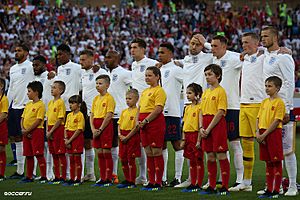
After Allardyce's resignation, Gareth Southgate, then the coach of the England under-21 team, was put in temporary charge of the national team until November 2016, before being given the position on a permanent basis at the end of that period. At the 2018 World Cup, England reached the semi-finals for the third time. After finishing second in their group, England faced Colombia in the round of 16 where they won on penalties for the first time at a World Cup, before beating Sweden in the quarter-finals. In the semi-final, they were beaten 2–1 in extra time by Croatia and finished fourth after losing the third place play-off match against Belgium. England striker Harry Kane finished the tournament as top scorer with six goals and was awarded the golden boot.
On 14 November 2019, England played their 1000th international match, defeating Montenegro 7–0 at Wembley in a Euro 2020 qualifying match.
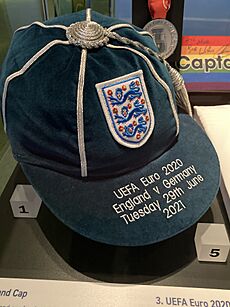
At the delayed Euro 2020, England reached their first European Championship final, their first final at a major tournament since 1966. After finishing top of their group above Croatia, Czechia, and Scotland, the Three Lions beat Germany, Ukraine and Denmark in the knockout rounds to advance to the final. In the final held at Wembley, England were defeated by Italy on penalties after a 1–1 draw.
At the 2022 World Cup, England defeated Iran and Wales in the group stage to qualify for the round of 16. In the round of 16, the Three Lions defeated Senegal 3–0, but were then eliminated by reigning world champions France in the quarter-finals, 2–1. In that match, Harry Kane scored his 53rd goal for England, equalling the all-time record at the time.
At Euro 2024, England finished top of their group above Denmark, Slovenia, and Serbia. In the round of 16, England defeated Slovakia 2–1 after extra time, with Jude Bellingham notably scoring a spectacular bicycle kick in second-half stoppage time to equalise the match. In the quarter-final, England beat Switzerland on penalties after the game finished 1–1. England reached their second consecutive European Championship final after defeating the Netherlands 2–1 in the semi-final. In the final, England were defeated 2–1 by Spain, becoming the first team to lose consecutive European Championship finals. With three goals, Harry Kane was the joint top scorer at the tournament and shared the golden boot with five other players.
Whilst the FA were willing to extend his contract further, Southgate announced his resignation as England manager on 16 July 2024, saying that it was "time for change, and for a new chapter". Under-21 manager Lee Carsley was subsequently appointed interim head coach of the senior team. On 16 October 2024, the FA announced that German manager Thomas Tuchel would take over as manager from 1 January 2025, becoming the third foreign coach to take up the position.
Team image
Kits and crest
Kit suppliers
| Kit supplier | Period | Ref |
|---|---|---|
| St. Blaize and Hope Brothers | 1949–1954 | |
| Umbro | 1954–1961 | |
| Bukta | 1959–1965 | |
| Umbro | 1965–1974 | |
| Admiral | 1974–1984 | |
| Umbro | 1984–2013 | |
| Nike | 2013–present |
Kit deals
| Kit supplier | Period | Contract announcement |
Contract duration |
Value |
|---|---|---|---|---|
| Nike | 2013–present | 3 September 2012 | Spring 2013 – July 2018 (5 years) | Total £125m (£25m per year) |
| 13 December 2016 | August 2018 – 2030 (12 years) | Total £400m (£33.3m per year) |
Crest
The motif of the England national football team has three lions passant guardant, the emblem of King Richard I, who reigned from 1189 to 1199. In 1872, English players wore white jerseys emblazoned with the three lions crest of the Football Association. The lions, often blue, have had minor changes to colour and appearance. Initially topped by a crown, this was removed in 1949 when the FA was given an official coat of arms by the College of Arms; this introduced ten Tudor roses, one for each of the regional branches of the FA. Since 2003, England top their logo with a star to recognise their World Cup win in 1966; this was first embroidered onto the left sleeve of the home kit, and a year later was moved to its current position, first on the away shirt.
Colours
England's traditional home colours are white shirts, navy blue shorts and white or black socks. The team has periodically worn an all-white kit.
Although England's first away kits were blue, England's traditional away colours are red shirts, white shorts and red socks. In 1996, England's away kit was changed to grey shirts, shorts and socks. This kit was only worn three times, including against Germany in the semi-final of Euro 1996 but the deviation from the traditional red was unpopular with supporters and the England away kit remained red until 2011, when a navy blue away kit was introduced. The away kit is also sometimes worn during home matches, when a new edition has been released to promote it.
England have occasionally had a third kit. At the 1970 World Cup England wore a third kit with pale blue shirts, shorts and socks against Czechoslovakia. They had a kit similar to Brazil's, with yellow shirts, yellow socks and blue shorts which they wore in the summer of 1973. For the World Cup in 1986 England had a third kit of pale blue, imitating that worn in Mexico 16 years before and England retained pale blue third kits until 1992, but they were rarely used.
Umbro first agreed to manufacture the kit in 1954 and since then has supplied most of the kits, the exceptions being from 1959 to 1965 with Bukta and 1974–1984 with Admiral. Nike purchased Umbro in 2008 and took over as kit supplier in 2013 following their sale of the Umbro brand.
Home stadium
For the first 50 years of their existence, England played their home matches all around the country. They initially used cricket grounds before later moving on to football club stadiums. The original Empire Stadium was built in Wembley, London, for the British Empire Exhibition.
England played their first match at the stadium in 1924 against Scotland and for the next 27 years Wembley was used as a venue for matches against Scotland only. The stadium later became known simply as Wembley Stadium and it became England's permanent home stadium during the 1950s. In October 2000, the stadium closed its doors, ending with a defeat against Germany.
This stadium was demolished during the period of 2002–03, and work began to completely rebuild it. During this time, England played at venues across the country, though by the time of the 2006 World Cup qualification, this had largely settled down to having Manchester United's Old Trafford stadium as the primary venue, with Newcastle United's St. James' Park used on occasions when Old Trafford was unavailable.
Their first match in the new Wembley Stadium was in March 2007 when they drew with Brazil. The stadium is now owned by the Football Association, via its subsidiary Wembley National Stadium Limited.
Rivalries
England's three main rivalries are with Scotland, Germany and Argentina. Smaller rivalries with France, Wales and the Republic of Ireland have also been observed.
England's rivalry with Scotland is one of the fiercest international rivalries that exists. It is the oldest international fixture in the world, first played in 1872 at Hamilton Crescent, Glasgow. The history of the British Isles has led to much rivalry between the nations in many forms, and the social and cultural effects of centuries of antagonism and conflict between the two has contributed to the intense nature of the sporting contests. Scottish nationalism has also been a factor in the Scots' desire to defeat England above all other rivals, with Scottish sports journalists traditionally referring to the English as the "Auld Enemy". The footballing rivalry has diminished somewhat since the late 1970s, particularly since the annual fixture stopped in 1989. For England, games against Germany and Argentina are now considered to be more important than the historic rivalry with Scotland.
England's rivalry with Germany is considered to be mainly an English phenomenon—in the run-up to any competition match between the two teams, many UK newspapers will print articles detailing results of previous encounters, such as England's win in 1966 and the semi-final penalty shoot-out defeats of 1990 and Euro 96. This rivalry has diminished significantly in recent years. Germans consider Italy, the Netherlands and France to be their greater rivals, and Barney Ronay of The Guardian wrote in 2021 that the rivalry with England "isn't a close rivalry at all, not if we accept the standard definition that both sides need to be aware that it exists. Germany have won seven major tournaments. Germany have reached 15 semi-finals since the 'one World Cup' of 1966."
England's rivalry with Argentina is highly competitive. Games between the two teams, even those that are only friendly matches, are often marked by notable and sometimes controversial incidents such as the hand of God in 1986. The rivalry is unusual in that it is an intercontinental one; typically such footballing rivalries exist between bordering nations. England is regarded in Argentina as one of the major rivals of the national football team, matched only by Brazil and Uruguay. The rivalry is, to a lesser extent reciprocal in England, locally described as a grudge match although matches against Germany carry a greater significance in popular perception. The rivalry emerged across several games during the latter half of the 20th century, even though as of 2008 the teams have played each other on only 14 occasions in full internationals. The rivalry was intensified, particularly in Argentina, by non-footballing events, especially the 1982 Falklands War between Argentina and the United Kingdom. England and Argentina have not met since a friendly in November 2005.
Songs
Numerous songs have been released about the England national football team.
Media coverage
All England matches are broadcast with full commentary on talkSPORT and BBC Radio 5 Live. From the 2008–09 season until the 2017–18 season, England's home and away qualifiers, and friendlies both home and away were broadcast live on ITV Sport (often with the exception of STV, the ITV franchisee in central and northern Scotland). England's away qualifiers for the 2010 World Cup were shown on Setanta Sports until that company's collapse. As a result of Setanta Sports's demise, England's World Cup qualifier in Ukraine on 10 October 2009 was shown in the United Kingdom on a pay-per-view basis via the internet only. This one-off event was the first time an England game had been screened in such a way. The number of subscribers, paying between £4.99 and £11.99 each, was estimated at between 250,000 and 300,000 and the total number of viewers at around 500,000. In 2018, Sky Sports broadcast the England Nations League and in-season friendlies, until 2021 and ITV Sport broadcast the European Qualifiers for Euro-World Cups and pre-tournament friendlies (after the Nations League group matches end), until 2022. In April 2022, Channel 4 won the rights for England matches until June 2024, including 2022–23 UEFA Nations League matches, Euro 2024 qualifying games, and friendlies. 2022 World Cup rights remained with the BBC and ITV.
Results and fixtures
The following is a list of match results in the last 12 months, as well as any future matches that have been scheduled.
Win Draw Loss Fixture
2024
| Friendly 23 March 2024 | England |
0–1 | London, England | |||
| 19:00 GMT (UTC±0) | https://int.soccerway.com/matches/2024/03/23/world/friendlies/england/brazil/4268141/ |
|
Stadium: Wembley Stadium Attendance: 83,467 Referee: Artur Soares Dias (Portugal) |
|||
| Friendly 26 March 2024 | England |
2–2 | London, England | |||
| 19:45 GMT (UTC±0) |
|
https://int.soccerway.com/matches/2024/03/26/world/friendlies/england/belgium/4268142/ | Stadium: Wembley Stadium Attendance: 80,733 Referee: Sebastian Gishamer (Austria) |
|||
| Friendly 3 June 2024 | England |
3–0 | Newcastle upon Tyne, England | |||
| 19:45 |
|
https://int.soccerway.com/matches/2024/06/03/world/friendlies/england/bosnia-herzegovina/4315492/ | Stadium: St James' Park Attendance: 50,061 Referee: Rohit Saggi (Norway) |
|||
| Friendly 7 June 2024 | England |
0–1 | London, England | |||
| 19:45 | https://int.soccerway.com/matches/2024/06/07/world/friendlies/england/iceland/4316969/ | Stadium: Wembley Stadium Referee: Davide Massa (Italy) |
||||
| UEFA Euro 2024 Group C 16 June 2024 | Serbia |
0–1 | Gelsenkirchen, Germany | |||
| 21:00 CEST (UTC+2) | https://www.uefa.com/uefaeuro/match/2036166/ |
|
Stadium: Arena AufSchalke Attendance: 48,953 Referee: Daniele Orsato (Italy) |
|||
| UEFA Euro 2024 Group C 20 June 2024 | Denmark |
1–1 | Frankfurt, Germany | |||
| 18:00 CEST (UTC+2) | Hjulmand |
https://www.uefa.com/uefaeuro/match/2036178/ | Kane |
Stadium: Waldstadion Attendance: 46,177 Referee: Artur Soares Dias (Portugal) |
||
| UEFA Euro 2024 Group C 25 June 2024 | England |
0–0 | Cologne, Germany | |||
| 21:00 CEST (UTC+2) | https://www.uefa.com/uefaeuro/match/2036189/ | Stadium: RheinEnergieStadion Attendance: 41,536 Referee: Clément Turpin (France) |
||||
| UEFA Euro 2024 Round of 16 30 June 2024 | England |
2–1 | Gelsenkirchen, Germany | |||
| 18:00 CEST (UTC+2) |
|
https://www.uefa.com/uefaeuro/match/2036200/ | Stadium: Arena AufSchalke Attendance: 47,244 Referee: Halil Umut Meler (Turkey) |
|||
| UEFA Euro 2024 Quarter-finals 6 July 2024 | England |
1–1 (5–3 pen)
|
Düsseldorf, Germany | |||
| 18:00 CEST (UTC+2) | https://www.uefa.com/uefaeuro/match/2036208/ |
|
Stadium: Merkur Spiel-Arena Attendance: 46,907 Referee: Daniele Orsato (Italy) |
|||
| Penalties | ||||||
*Palmer
|
* |
|||||
| UEFA Euro 2024 Semi-finals 10 July 2024 | Netherlands |
1–2 | Dortmund, Germany | |||
| 21:00 CEST (UTC+2) |
|
https://www.uefa.com/uefaeuro/match/2036210/ | Stadium: Westfalenstadion Attendance: 60,926 Referee: Felix Zwayer (Germany) |
|||
| UEFA Euro 2024 Final 14 July 2024 | Spain |
2–1 | Berlin, Germany | |||
| 21:00 CEST (UTC+2) | https://www.uefa.com/uefaeuro/match/2036211/ | Stadium: Olympiastadion Attendance: 65,600 Referee: François Letexier (France) |
||||
| 2024–25 UEFA Nations League Group B2 7 September 2024 | Republic of Ireland |
0–2 | Dublin, Ireland | |||
| 17:00 BST (UTC+1) | https://www.uefa.com/uefanationsleague/match/2040061/ | Stadium: Aviva Stadium Attendance: 50,359 Referee: José María Sánchez (Spain) |
||||
| 2024–25 UEFA Nations League Group B2 10 September 2024 | England |
2–0 | London, England | |||
| 19:45 BST (UTC+1) |
|
https://www.uefa.com/uefanationsleague/match/2040088/ | Stadium: Wembley Stadium Attendance: 70,221 Referee: Morten Krøgh (Denmark) |
|||
| 2024–25 UEFA Nations League Group B2 10 October 2024 | England |
1–2 | London, England | |||
| 19:45 BST (UTC+1) |
|
https://www.uefa.com/uefanationsleague/match/2040103/ | Stadium: Wembley Stadium Attendance: 79,012 Referee: Andrea Colombo (Italy) |
|||
| 2024–25 UEFA Nations League Group B2 13 October 2024 | Finland |
1–3 | Helsinki, Finland | |||
| 19:00 ESST (UTC+3) | https://www.uefa.com/uefanationsleague/match/2040124/ |
|
Stadium: Helsinki Olympic Stadium Attendance: 32,411 Referee: Giorgi Kruashvili (Georgia) |
|||
| 2024–25 UEFA Nations League Group B2 14 November 2024 | Greece |
0–3 | Athens, Greece | |||
| 21:45 EET (UTC+2) | https://www.uefa.com/uefanationsleague/match/2040151/ | Stadium: Olympic Stadium Attendance: 60,664 Referee: Daniel Siebert (Germany) |
||||
| 2024–25 UEFA Nations League Group B2 17 November 2024 | England |
5–0 | London, England | |||
| 17:00 GMT (UTC±0) | https://www.uefa.com/uefanationsleague/match/2040177/ | Stadium: Wembley Stadium Attendance: 79,969 Referee: Erik Lambrechts (Belgium) |
||||
Coaching staff
| Position | Name |
|---|---|
| Manager | |
| Assistant manager | |
| Goalkeeping coach | |
| Coach | |
| First-team doctor | |
| Head of performance | |
| Physical performance coach | |
| Nutritionist | |
| Head of performance medicine | |
| Lead performance doctor | |
| Lead physiotherapist | |
| Lead performance analyst | |
| Senior performance analyst | |
| Head of performance analysis and insight |
From 1 January 2025
| Position | Name |
|---|---|
| Manager | |
| Assistant manager |
Players
Current squad
The following 22 players were named in the squad for the 2024–25 UEFA Nations League matches against Greece and the Republic of Ireland on 14 and 17 November 2024 respectively.
Caps and goals are correct as of 17 November 2024, after the match against the Republic of Ireland.
| No. | Pos. | Player | Date of birth (age) | Caps | Goals | Club |
|---|---|---|---|---|---|---|
| 1 | GK | Jordan Pickford | 7 March 1994 | 73 | 0 | |
| 13 | GK | Dean Henderson | 12 March 1997 | 2 | 0 | |
| 22 | GK | James Trafford | 10 October 2002 | 0 | 0 | |
|
|
||||||
| 2 | DF | Kyle Walker | 28 May 1990 | 93 | 1 | |
| 3 | DF | Rico Lewis | 28 November 2004 | 5 | 0 | |
| 6 | DF | Marc Guéhi | 13 July 2000 | 22 | 0 | |
| 12 | DF | Lewis Hall | 8 September 2004 | 2 | 0 | |
| 14 | DF | Tino Livramento | 12 November 2002 | 1 | 0 | |
| 15 | DF | Jarell Quansah | 29 January 2003 | 0 | 0 | |
| 16 | DF | Taylor Harwood-Bellis | 30 January 2002 | 1 | 1 | |
|
|
||||||
| 4 | MF | Conor Gallagher | 6 February 2000 | 21 | 1 | |
| 7 | MF | Morgan Gibbs-White | 27 January 2000 | 2 | 0 | |
| 8 | MF | Angel Gomes | 31 August 2000 | 4 | 0 | |
| 10 | MF | Jude Bellingham | 29 June 2003 | 40 | 6 | |
| 17 | MF | Curtis Jones | 30 January 2001 | 2 | 1 | |
|
|
||||||
| 9 | FW | Harry Kane (captain) | 28 July 1993 | 103 | 69 | |
| 11 | FW | Anthony Gordon | 24 February 2001 | 9 | 1 | |
| 18 | FW | Ollie Watkins | 30 December 1995 | 18 | 5 | |
| 19 | FW | Morgan Rogers | 26 July 2002 | 2 | 0 | |
| 20 | FW | Jarrod Bowen | 20 December 1996 | 14 | 1 | |
| 21 | FW | Dominic Solanke | 14 September 1997 | 3 | 0 | |
| 23 | FW | Noni Madueke | 10 March 2002 | 5 | 0 | |
Recent call-ups
The following players have also been called up to the England squad within the last twelve months.
| Pos. | Player | Date of birth (age) | Caps | Goals | Club | Latest call-up |
|---|---|---|---|---|---|---|
| GK | Aaron Ramsdale | 14 May 1998 | 5 | 0 | v. |
|
| GK | Nick Pope | 19 April 1992 | 10 | 0 | v. |
|
| GK | Sam Johnstone | 25 March 1993 | 4 | 0 | v. |
|
|
|
||||||
| DF | Ezri Konsa | 23 October 1997 | 9 | 0 | v. |
|
| DF | Jarrad Branthwaite | 27 June 2002 | 1 | 0 | v. |
|
| DF | Trent Alexander-Arnold | 7 October 1998 | 33 | 4 | v. |
|
| DF | Levi Colwill | 26 February 2003 | 4 | 0 | v. |
|
| DF | John Stones | 28 May 1994 | 83 | 3 | v. |
|
| DF | Harry Maguire | 5 March 1993 | 64 | 7 | v. |
|
| DF | Kieran Trippier RET | 19 September 1990 | 54 | 1 | UEFA Euro 2024 | |
| DF | Luke Shaw | 12 July 1995 | 34 | 3 | UEFA Euro 2024 | |
| DF | Joe Gomez | 23 May 1997 | 15 | 0 | UEFA Euro 2024 | |
| DF | Lewis Dunk | 21 November 1991 | 6 | 0 | UEFA Euro 2024 | |
| DF | Ben Chilwell | 21 December 1996 | 21 | 1 | v. |
|
|
|
||||||
| MF | Declan Rice | 14 January 1999 | 62 | 5 | v. |
|
| MF | Phil Foden | 28 May 2000 | 43 | 4 | v. |
|
| MF | Cole Palmer | 6 May 2002 | 11 | 2 | v. |
|
| MF | Kobbie Mainoo | 19 April 2005 | 10 | 0 | v. |
|
| MF | Adam Wharton | 6 February 2004 | 1 | 0 | UEFA Euro 2024 | |
| MF | James Maddison | 23 November 1996 | 7 | 0 | UEFA Euro 2024 PRE | |
| MF | Jordan Henderson (vice-captain) | 17 June 1990 | 81 | 3 | v. |
|
|
|
||||||
| FW | Bukayo Saka | 5 September 2001 | 43 | 12 | v. |
|
| FW | Jack Grealish | 10 September 1995 | 39 | 4 | v. |
|
| FW | Eberechi Eze | 29 June 1998 | 9 | 0 | v. |
|
| FW | Ivan Toney | 16 March 1996 | 6 | 1 | UEFA Euro 2024 | |
| FW | Marcus Rashford | 31 October 1997 | 60 | 17 | v. |
|
|
INJ Withdrew due to injury |
||||||
Individual records
Most appearances
.
| Rank | Player | Caps | Goals | Position | Career |
|---|---|---|---|---|---|
| 1 | Peter Shilton | 125 | 0 | GK | 1970–1990 |
| 2 | Wayne Rooney | 120 | 53 | FW | 2003–2018 |
| 3 | David Beckham | 115 | 17 | MF | 1996–2009 |
| 4 | Steven Gerrard | 114 | 21 | MF | 2000–2014 |
| 5 | Bobby Moore | 108 | 2 | DF | 1962–1973 |
| 6 | Ashley Cole | 107 | 0 | DF | 2001–2014 |
| 7 | Bobby Charlton | 106 | 49 | MF | 1958–1970 |
| Frank Lampard | 106 | 29 | MF | 1999–2014 | |
| 9 | Billy Wright | 105 | 3 | DF | 1946–1959 |
| 10 | Harry Kane | 103 | 69 | FW | 2015–present |
Top goalscorers
.
| Rank | Player | Goals | Caps | Average | Career |
|---|---|---|---|---|---|
| 1 | Harry Kane (list) | 69 | 103 | 0.67 | 2015–present |
| 2 | Wayne Rooney (list) | 53 | 120 | 0.44 | 2003–2018 |
| 3 | Bobby Charlton (list) | 49 | 106 | 0.46 | 1958–1970 |
| 4 | Gary Lineker | 48 | 80 | 0.60 | 1984–1992 |
| 5 | Jimmy Greaves | 44 | 57 | 0.77 | 1959–1967 |
| 6 | Michael Owen | 40 | 89 | 0.45 | 1998–2008 |
| 7 | Nat Lofthouse | 30 | 33 | 0.91 | 1950–1958 |
| Alan Shearer | 30 | 63 | 0.48 | 1992–2000 | |
| Tom Finney | 30 | 76 | 0.39 | 1946–1958 | |
| 10 | Vivian Woodward | 29 | 23 | 1.26 | 1903–1911 |
| Frank Lampard | 29 | 106 | 0.27 | 1999–2014 |
Most clean sheets
.
| Rank | Player | Clean sheets | Caps | Average | Career |
|---|---|---|---|---|---|
| 1 | Peter Shilton | 66 | 125 | 0.53 | 1970–1990 |
| 2 | Joe Hart | 43 | 75 | 0.57 | 2008–2017 |
| 3 | David Seaman | 40 | 75 | 0.53 | 1988–2002 |
| 4 | Gordon Banks | 35 | 73 | 0.48 | 1963–1972 |
| Jordan Pickford | 35 | 73 | 0.48 | 2017–present | |
| 6 | Ray Clemence | 27 | 61 | 0.44 | 1972–1983 |
| 7 | Chris Woods | 26 | 43 | 0.60 | 1985–1993 |
| 8 | Paul Robinson | 24 | 41 | 0.59 | 2003–2007 |
| 9 | David James | 21 | 53 | 0.40 | 1997–2010 |
| 10 | Nigel Martyn | 13 | 23 | 0.57 | 1992–2002 |
Manager records
- Most manager appearances
- Walter Winterbottom: 139
- Highest win ratio (minimum 25 games in charge, including friendlies)
- Fabio Capello: 66.7%
- Most wins in major tournaments
- Gareth Southgate: 14
- Youngest to take job
- Walter Winterbottom: 33 years old
- Oldest to take job
- Roy Hodgson: 64 years old
Team records
- Biggest win
- 13–0 vs. Ireland, 18 February 1882
- Biggest defeat
- 1–7 vs. Hungary, 23 May 1954
- Longest unbeaten run
- 22 games from 18 November 2020 to 29 March 2022
- Longest winless run
- 7 games from 11 May 1958 to 4 October 1958
- Most consecutive wins
- 10 games from 6 June 1908 to 1 June 1909
- Most consecutive matches without conceding a goal
- 7 games from 2 June 2021 to 3 July 2021
Competitive record
FIFA World Cup
England first appeared at the 1950 FIFA World Cup, and have subsequently qualified for a total of 16 World Cup tournaments, tied for sixth best by number of appearances. They are also placed sixth by number of wins, with 32. The national team is one of only eight nations to have won at least one FIFA World Cup title. The England team won their first and only World Cup title in 1966. The tournament was played on home soil, and England defeated West Germany 4–2 in the final. In 1990, England finished in fourth place, losing 2–1 to host nation Italy in the third place play-off, following defeat on penalties, after extra time, to champions West Germany in the semi-final. They also finished in fourth place in 2018, losing 2–0 to Belgium in the third place play-off, following a 2–1 defeat to Croatia, again after extra time, in the semi-final. The team also reached the quarter-final stage in 1954, 1962, 1970, 1986, 2002, 2006 and 2022.
England failed to qualify for the World Cup in 1974, 1978 and 1994. The team's earliest exit in the finals tournament was elimination in the first round in 1950, 1958 and, most recently, 2014. This was after being defeated in both their opening two matches for the first time, against Italy and Uruguay in Group D. In 1950, four teams remained after the first round, in 1958 eight teams remained and in 2014 sixteen teams remained. In 2010, England suffered its most resounding World Cup defeat, 4–1 to Germany, in the round of 16 stage.
| FIFA World Cup record | Qualifying record | Manager(s) | ||||||||||||||||
|---|---|---|---|---|---|---|---|---|---|---|---|---|---|---|---|---|---|---|
| Year | Round | Pos | Pld | W | D | L | GF | GA | Squad | Pld | W | D | L | GF | GA | |||
| Not a FIFA member | Not a FIFA member | None | ||||||||||||||||
| Group stage | 8th | 3 | 1 | 0 | 2 | 2 | 2 | Squad | 3 | 3 | 0 | 0 | 14 | 3 | Winterbottom | |||
| Quarter-finals | 7th | 3 | 1 | 1 | 1 | 8 | 8 | Squad | 3 | 3 | 0 | 0 | 11 | 4 | ||||
| Group stage | 11th | 4 | 0 | 3 | 1 | 4 | 5 | Squad | 4 | 3 | 1 | 0 | 15 | 5 | ||||
| Quarter-finals | 8th | 4 | 1 | 1 | 2 | 5 | 6 | Squad | 4 | 3 | 1 | 0 | 16 | 2 | ||||
| Champions | 1st | 6 | 5 | 1 | 0 | 11 | 3 | Squad | Qualified as hosts | Ramsey | ||||||||
| Quarter-finals | 8th | 4 | 2 | 0 | 2 | 4 | 4 | Squad | Qualified as defending champions | Ramsey | ||||||||
| Did not qualify | 4 | 1 | 2 | 1 | 3 | 4 | ||||||||||||
| 6 | 5 | 0 | 1 | 15 | 4 | Revie | ||||||||||||
| Second group stage | 6th | 5 | 3 | 2 | 0 | 6 | 1 | Squad | 8 | 4 | 1 | 3 | 13 | 8 | Greenwood | |||
| Quarter-finals | 8th | 5 | 2 | 1 | 2 | 7 | 3 | Squad | 8 | 4 | 4 | 0 | 21 | 2 | Robson | |||
| Fourth place | 4th | 7 | 3 | 3 | 1 | 8 | 6 | Squad | 6 | 3 | 3 | 0 | 10 | 0 | Robson | |||
| Did not qualify | 10 | 5 | 3 | 2 | 26 | 9 | Taylor | |||||||||||
| Round of 16 | 9th | 4 | 2 | 1 | 1 | 7 | 4 | Squad | 8 | 6 | 1 | 1 | 15 | 2 | Hoddle | |||
| Quarter-finals | 6th | 5 | 2 | 2 | 1 | 6 | 3 | Squad | 8 | 5 | 2 | 1 | 16 | 6 | Keegan, Wilkinson, Eriksson | |||
| 7th | 5 | 3 | 2 | 0 | 6 | 2 | Squad | 10 | 8 | 1 | 1 | 17 | 5 | Eriksson | ||||
| Round of 16 | 13th | 4 | 1 | 2 | 1 | 3 | 5 | Squad | 10 | 9 | 0 | 1 | 34 | 6 | Capello | |||
| Group stage | 26th | 3 | 0 | 1 | 2 | 2 | 4 | Squad | 10 | 6 | 4 | 0 | 31 | 4 | Hodgson | |||
| Fourth place | 4th | 7 | 3 | 1 | 3 | 12 | 8 | Squad | 10 | 8 | 2 | 0 | 18 | 3 | Allardyce, Southgate | |||
| Quarter-finals | 6th | 5 | 3 | 1 | 1 | 13 | 4 | Squad | 10 | 8 | 2 | 0 | 39 | 3 | Southgate | |||
| To be determined | To be determined | Tuchel | ||||||||||||||||
| Total | 1 Title | 16/22 | 74 | 32 | 22 | 20 | 104 | 68 | — | 122 | 84 | 27 | 11 | 314 | 70 | — | ||
- Champions Runners-up Third place Fourth place Hosted tournament
- Correct as of 10 December 2022
UEFA European Championship
England first entered the UEFA European Championship in 1964, and have since qualified for eleven tournaments, tied for fourth-best by number of finals appearances. England's best results at the tournament were finishing as runners-up in both the 2020 (held in 2021) and 2024 editions, followed by a third-place finish in 1968 and reaching the semi-finals of 1996, a tournament they hosted. In addition, England have reached the quarter-finals on two further occasions, in 2004 and 2012.
England's worst results in the finals tournament to date have been first round eliminations in 1980, 1988, 1992 and 2000, whilst they failed to qualify for the finals in 1964, 1972, 1976, 1984 and 2008.
| UEFA European Championship record | Qualifying record | Manager(s) | ||||||||||||||||
|---|---|---|---|---|---|---|---|---|---|---|---|---|---|---|---|---|---|---|
| Year | Round | Pos | Pld | W | D | L | GF | GA | Squad | Pld | W | D | L | GF | GA | |||
| Did not enter | Did not enter | Winterbottom | ||||||||||||||||
| Did not qualify | 2 | 0 | 1 | 1 | 3 | 6 | Winterbottom, Ramsey | |||||||||||
| Third place | 3rd | 2 | 1 | 0 | 1 | 2 | 1 | Squad | 8 | 6 | 1 | 1 | 18 | 6 | Ramsey | |||
| Did not qualify | 8 | 5 | 2 | 1 | 16 | 6 | Ramsey | |||||||||||
| Did not qualify | 6 | 3 | 2 | 1 | 11 | 3 | Revie | |||||||||||
| Group stage | 6th | 3 | 1 | 1 | 1 | 3 | 3 | Squad | 8 | 7 | 1 | 0 | 22 | 5 | Greenwood | |||
| Did not qualify | 8 | 5 | 2 | 1 | 23 | 3 | Robson | |||||||||||
| Group stage | 7th | 3 | 0 | 0 | 3 | 2 | 7 | Squad | 6 | 5 | 1 | 0 | 19 | 1 | ||||
| 7th | 3 | 0 | 2 | 1 | 1 | 2 | Squad | 6 | 3 | 3 | 0 | 7 | 3 | Taylor | ||||
| Semi-finals | 3rd | 5 | 2 | 3 | 0 | 8 | 3 | Squad | Qualified as hosts | Venables | ||||||||
| Group stage | 11th | 3 | 1 | 0 | 2 | 5 | 6 | Squad | 10 | 4 | 4 | 2 | 16 | 5 | Hoddle, Keegan | |||
| Quarter-finals | 5th | 4 | 2 | 1 | 1 | 10 | 6 | Squad | 8 | 6 | 2 | 0 | 14 | 5 | Eriksson | |||
| Did not qualify | 12 | 7 | 2 | 3 | 24 | 7 | McClaren | |||||||||||
| Quarter-finals | 5th | 4 | 2 | 2 | 0 | 5 | 3 | Squad | 8 | 5 | 3 | 0 | 17 | 5 | Capello, Hodgson | |||
| Round of 16 | 12th | 4 | 1 | 2 | 1 | 4 | 4 | Squad | 10 | 10 | 0 | 0 | 31 | 3 | Hodgson | |||
| Runners-up | 2nd | 7 | 5 | 2 | 0 | 11 | 2 | Squad | 8 | 7 | 0 | 1 | 37 | 6 | Southgate | |||
| Runners-up | 2nd | 7 | 3 | 3 | 1 | 8 | 6 | Squad | 8 | 6 | 2 | 0 | 22 | 4 | ||||
| To be determined | To be determined | |||||||||||||||||
| To be determined | ||||||||||||||||||
| Total | Runners-up | 11/17 | 45 | 18 | 16 | 11 | 59 | 43 | — | 116 | 79 | 26 | 11 | 270 | 68 | — | ||
- Champions Runners-up Third place/Semi-finalists Hosted tournament
- Correct as of 14 July 2024
UEFA Nations League
England have competed in the UEFA Nations League since its inaugural season in 2018–19, when they qualified for the 2019 finals and finished third overall. To date, this is their only appearance in the finals and their best performance in the competition.
| UEFA Nations League record | |||||||||||||||||||||||
|---|---|---|---|---|---|---|---|---|---|---|---|---|---|---|---|---|---|---|---|---|---|---|---|
| League phase | Finals | Manager(s) | |||||||||||||||||||||
| Season | Lg | Grp | Pos | Pld | W | D | L | GF | GA | P/R | Rnk | Year | Pos | Pld | W | D | L | GF | GA | Squad | |||
| 2018–19 | A | 4 | 1st | 4 | 2 | 1 | 1 | 6 | 5 | 4th | 3rd | 2 | 0 | 1 | 1 | 1 | 3 | Squad | Southgate | ||||
| 2020–21 | A | 2 | 3rd | 6 | 3 | 1 | 2 | 7 | 4 | 9th | Did not qualify | Southgate | |||||||||||
| 2022–23 | A | 3 | 4th | 6 | 0 | 3 | 3 | 4 | 10 | 15th | |||||||||||||
| 2024–25 | B | 2 | 1st | 6 | 5 | 0 | 1 | 16 | 3 | 17th | Carsley | ||||||||||||
| Total | 22 | 10 | 5 | 7 | 33 | 22 | 3rd | Total | 1/4 | 2 | 0 | 1 | 1 | 1 | 3 | — | — | ||||||
- Champions Runners-up Third place Fourth place
- Correct as of 17 November 2024
Minor tournaments
| Year | Round | Position | Pld | W | D | L | GF | GA | Ref. |
|---|---|---|---|---|---|---|---|---|---|
| Group stage | 3rd | 3 | 0 | 1 | 2 | 2 | 7 | ||
| Group stage | 2nd | 3 | 2 | 0 | 1 | 6 | 4 | ||
| One match | 2nd | 1 | 0 | 0 | 1 | 0 | 1 | ||
| Group stage | 3rd | 2 | 0 | 0 | 2 | 1 | 3 | ||
| Group stage | 2nd | 2 | 1 | 0 | 1 | 3 | 1 | ||
| Winners, one match | 1st | 1 | 1 | 0 | 0 | 2 | 1 | ||
| Group stage | 2nd | 2 | 0 | 2 | 0 | 1 | 1 | ||
| Winners, group stage | 1st | 2 | 1 | 1 | 0 | 2 | 1 | ||
| Winners, group stage | 1st | 2 | 1 | 1 | 0 | 2 | 0 | ||
| Winners, group stage | 1st | 2 | 1 | 1 | 0 | 5 | 3 | ||
| Group stage | 2nd | 3 | 1 | 1 | 1 | 6 | 7 | ||
| Winners, group stage | 1st | 3 | 2 | 0 | 1 | 3 | 1 | ||
| Group stage | 2nd | 2 | 1 | 1 | 0 | 1 | 0 | ||
| Winners, group stage | 1st | 2 | 1 | 1 | 0 | 7 | 2 | ||
| Total | 6 Titles | 33 | 12 | 10 | 11 | 43 | 37 | – |
Honours
Major competitions
- FIFA World Cup
- Champions (1): 1966
- UEFA European Championship
- UEFA Nations League
- Third place (1): 2019
Regional
- British Home Championship
- Champions (54)
- Outright winners (34): 1888, 1891, 1892, 1893, 1895, 1898, 1899, 1901, 1904, 1905, 1909, 1911, 1913, 1930, 1932, 1938, 1947, 1948, 1950, 1954, 1955, 1957, 1961, 1965, 1966, 1968, 1969, 1971, 1973, 1975, 1978, 1979, 1982, 1983
- Shared (20): 1886, 1890, 1903, 1906, 1908, 1912, 1927, 1931, 1935, 1939, 1952, 1953, 1956, 1958, 1959, 1960, 1964, 1970, 1972, 1974
- Champions (54)
Friendly
- Rous Cup
- Champions: 1986, 1988, 1989
- England Challenge Cup
- Champions: 1991
- Tournoi de France
- Champions: 1997
- FA Summer Tournament
- Champions: 2004
Awards
Summary
| Competition | |
|
|
Total |
|---|---|---|---|---|
| FIFA World Cup | 1 | 0 | 0 | 1 |
| UEFA European Championship | 0 | 2 | 1 | 3 |
| UEFA Nations League | 0 | 0 | 1 | 1 |
| Total | 1 | 2 | 2 | 5 |
See also
 In Spanish: Selección de fútbol de Inglaterra para niños
In Spanish: Selección de fútbol de Inglaterra para niños
- Great Britain men's Olympic football team
- England national football team manager
- England women's national football team
- England national amateur football team
- United Kingdom national football team
- England national football B team
- England national football C team


